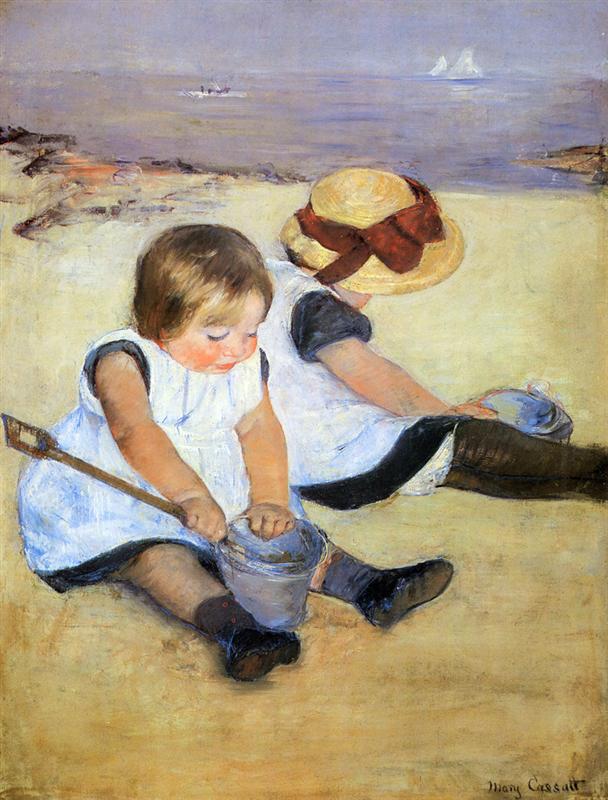Denver Art Museum
Oct 22, 2017–Jan 15, 2018
Speed Art Museum Louisville, Kentucky
February 17 – May 13, 2018
Clark Art Institute Williamstown, Massachusetts
June 6–September 3, 2018
The groundbreaking exhibition Women Artists in the Age of Impressionism broadly surveys a key chapter in art history in which an international group of female artists overcame gender-based restrictions to make remarkable creative strides. Featuring more than eighty paintings by thirty-seven artists from thirteen countries, drawn from prominent collections across the United States and abroad, this exhibition presents renowned artists such as Berthe Morisot (French), Mary Cassatt (American), and Rosa Bonheur (French) alongside lesser-known yet equally important peers including Anna Ancher (Danish), Lilla Cabot Perry (American), and Paula Modersohn-Becker (German).
During the mid-nineteenth century, Paris was the epicenter of the art world, luring artists from around the globe to its academies, museums, salons, and galleries. Scores of women artists traveled to the French capital to develop their art and further their careers, yet despite the city’s cosmopolitan character, gender norms remained strikingly conservative. Only later in the century did French women gain such fundamental rights as receiving a secondary education (1879), opening a bank account (1881), and obtaining legal guardianship of their children (1907).
Women were not allowed to attend the École des Beaux-Arts – the country’s most important art academy – until 1897. Barred from this prestigious institution, and largely unable to participate in the Salon system, women pursued alternative venues by attending private academies, exhibiting independently, and forming their own organizations, such as the Union des Femmes Peintres et Sculpteurs in 1881.
Moral and social stigmas also hindered women’s full participation in the period’s artistic circles. Taboos against females being seen in public without a chaperone limited their access to certain spaces and narrowed the range of subjects they could represent. History painting, the foremost genre of the Academy, relied on accurate depictions of nude or draped figures, but as most women artists had scant opportunities to study from nude models, many instead gravitated toward avant-garde movements. Such work often emphasized genre scenes, the models for which could be found in the domestic sphere.
Women Artists in the Age of Impressionism expands our understanding of this rich art historical period and demonstrates the formative role women artists played in the major currents of European modernism, including Realism, Impressionism, and Symbolism. The forward-thinking women represented in this exhibition not only created powerful paintings but also generated a momentum that has led toward a more egalitarian art world.
Women Artists in the Age of Impressionism is organized by the American Federation of Arts. Guest curator Laurence Madeline, Chief Curator for French National Heritage, was aided by Suzanne Ramljak, AFA Curator, and Jeremiah William McCarthy, AFA Associate Curator. Presentation of the exhibition at the Speed Art Museum is coordinated by Erika Holmquist-Wall, Chief Curator at the Speed Art Museum.
Catalogue
byFeaturing thirty-six artists from eleven different countries, this beautifully illustrated book explores the strength of these women’s creative achievements, through paintings by acclaimed Impressionists such as Mary Cassatt and Berthe Morisot, and extraordinary lesser-known artists such as Marie Bashkirtseff, Anna Bilińska-Bohdanowicz, Paula Modersohn-Becker, and Hanna Pauli. It examines their work against the sociopolitical background of the period, when women were mostly barred from formal artistic education but cleverly navigated the city’s network of ateliers, salons, and galleries. Essays consider the powerfully influential work of women Impressionists, representations of the female artist in portraiture, the unique experiences of Nordic women artists, and the significant presence of women artists throughout the history of the Paris Salon. By addressing the long-undervalued contributions of women to the art of the later 19th century, Women Artists in Paris pays tribute to pioneers who not only created remarkable paintings but also generated momentum toward a more egalitarian art world.
Images
Marie Bashkirtseff’s ‘In the Studio’ (1881) Photo: Dnipropetrovsk/Bridgeman Images; American Federation of Arts

Mary Cassatt’s ‘Children Playing on the Beach’ (1884) Photo: National Gallery of Art, Washington D.C.; American Federation of Arts

Marie Bashkirtseff’s ‘The Meeting’ (1884) Photo: Musée d’Orsay, Paris;: Jan Schormans ©RMN-Grand Palais/Art Resource, NY; American Federation of Arts
Recommended For YouPowered by SailThru

Marie Bracquemond (French, 1840-1916). On the Terrace at Sèvres (Sur la terrasse à Sèvres), 1880. Oil on canvas; 34-5/8x 45-1/4in.Musée du Petit Palais, Geneva. Photo: Erich Lessing / Art Resource, NY. Courtesy American Federation of Arts

Berthe Morisot (French, 1841-1895). "The Sisters," 1869. Oil on canvas; 20-1/2x 32 in.National Gallery of Art, Washington D.C., Gift of Mrs. Charles S. Carstairs, 1952.9.2. Courtesy American Federation of Arts.
\

